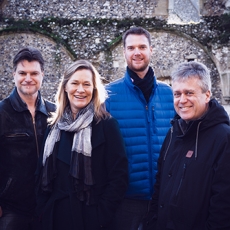Gothic Voices - Mary Star Of The Sea - American Record Guide
This recording of musical settings of Marian devotional texts combines music of the 13th to 15th Centuries with the work of two contem- porary composers: Joanne Metcalf (b 1958) and Andrew Smith (b 1970). The vocal ensemble Gothic Voices, founded in 1980, is primari- ly an early music ensemble, devoted to “bringing medieval music into the mainstream”. Their outstanding virtuosity and scholarly integrity guarantee that this is not a cheap popularizing of early music, but a communication of the vitality that is inherent in the medieval repertory. They also perform modern works, especially ones with medieval associations, like the pieces by Metcalf and Smith. The program is in two parts. Part I is concerned with the mystical side of Marian devotion. It includes three of the ten movements of the cycle Il Nome del Bel Fior (1998) by Metcalf, based on a passage from Canto 23 of Dante’s Paradiso. At the risk of using a loaded term, Metcalf’s music here tends to be minimalist, in that she often unfolds a very brief text very slowly in music that involves a fair amount of repetition. In addition to the Dante cycle, the program includes her ‘Music for the Star of the Sea’, whose text consists only of the vowels “o” and “a” and the words “Ave maris stella” in a piece that takes eight minutes. On the other hand, the fourth movement of the Dante cycle gives 15 lines of the poet’s text in a concise setting. Metcalf ’s music alternates with examples of medieval polyphony, with special emphasis on the mellifluous writing of 15th-Century English composers like John Dunstable, Leonel Power, and Richard Smert. Part II is concerned with the human side of Mary, particularly in reference to the Incarnation and her sorrow at the Crucifixion. The centerpiece is a monophonic setting of the 13th-Century English poem ‘Stond Wel, Moder, Under Rode’, based on the sequence ‘Stabat Iuxta Christi Crucem’. Also in this part of the program are Andrew Smith’s largely homophonic settings in two movements of stanzas from the medieval English poem. The program concludes with an exuberant anonymous polytextual motet of the 13th Century, ‘Alleluia psallat/ Alleluia concinat’. These performances are nothing short of amazing for their unanimity of ensemble, perfectly blended tone, and flawless intonation. The recording was made in the friendly acoustic of Boxgrove Priory, West Sussex. The sound is rich and somewhat dark.

